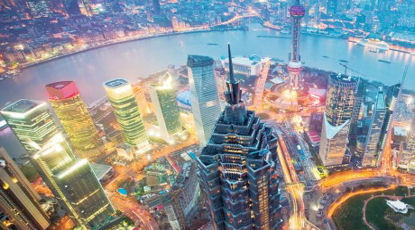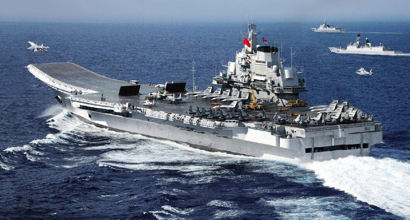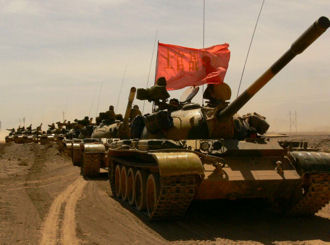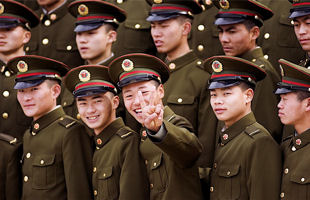Rise of the Reds Canon Fodder, Episode 4, Pure Story Content |

Rise of the Reds Canon Fodder, Episode 4, Pure Story Content |
 7 Aug 2013, 14:26 7 Aug 2013, 14:26
Post
#1
|
|
  Group: Project Leader Posts: 5870 Joined: 2 June 2009 Member No.: 10 |
Warriors of the Modern Way: A brief history of the new Red Guard Since the late 1970s, the People's Republic of China had changed drastically from its Maoist roots: Under the rule of Deng Xiaoping, the country adopted a system that would quickly be popularised as 'socialism with Chinese characteristics', essentially a socialist market economy that was distinctly different from the rigidly planned economy of the Soviet Union. Over the years, this unique combination of socialism and capitalism allowed China to achieve a strong standing on the global market and turned its economy into an export powerhouse that even surpassed the likes of America, Japan and Germany in the early 21st century. But the global economic crisis of the following years eventually slowed China's growth. Fuelled by ongoing industrialisation and elaborate construction projects, the PRC's economy continued to run on its own momentum until 2018, when the partial collapse of the country's inflated real estate sector resulted in the closest thing to a recession in decades.  The vibrant business district of Shanghai At that time, the stability of Asia was threatened by severe tensions: The war on the Korean Peninsula briefly escalated after one blatant Northern provocation too many while the United States and China found themselves wrestling for strategic influence in the Pacific despite their heavily connected economies which prevented a direct confrontation between the two giants. It was within this context when a group of hawkish military hardliners within the Chinese Party government risked a gamble and ordered a massive invasion against Taiwan, one of America's strategic partners in the region. With US forces tied up in the perpetual brushfire wars of the Middle East and the resurgent fighting in Korea, the Republic of China was left to fend for itself. The battle was brief but extremely fierce and in the end, the combined forces of the People's Liberation Army stood victorious thanks to General Shin Fai's swift execution of the landings. Taiwan was annexed into the People's Republic as a special administrative region with a degree of autonomy for the following fifty years until the island would be fully integrated.  A J-15 fighter takes off from the aircraft carrier Liaoning The risky gamble may have payed off for China, whose naval combat capabilities shocked both the Americans and the Japanese, but not for the hardliners, who were soon arrested by the more moderate leaders within the Party. The palace revolt gave rise to the sixth generation of Chinese rulers who were led by the new Chairman Zhao Wei, a charismatic reformist who quickly used his power to pave the way for the 'Modern Way' programme, the single largest catalogue of socio-political reforms in China's recent history. During that time, it became apparent that the country's lobsided gender ratio would at some point become the undoing of its economy and stability. As a result of ancestral customs and ingrained social roles, families preferred to have sons rather than daughters which gave rise to crimes like child trade and infanticide. In only a few decades, China would become a nation with way too many males that would no longer be able to revitalise the aging workforce that sustained the nation's already troubled social and healthcare systems. As one of the most famous reforms of the Modern Way, the One Child policy was effectively suspended, granting a new degree of freedom to Chinese families. The basic idea of freedom and openness was a golden thread that ran throughout the entire programme, which - at least nominally - liberalised the media and introduced elements of communal and provincial democracy that allowed the people to vote over which Party representative they wanted to install. The socio-political liberalisation of China happened in babysteps, but Chairman Zhao hoped that his actions would set an example and that the future rulers would continue on the new course. There was much discussion in China and around the world as to whether Chairman Zhao would go down in history as the great renewer of an intransparent, nepotistic system or a misguided adventurist who paved the way for the country's downfall. Tragically, he did not live to see the outcomes of his Modern Way: In October 2019, China was celebrating its 70th anniversary as a People's Republic and millions of citizens followed the grand military parade in Beijing via public infoscreens, televisions and smartphones when tragedy struck. A terrorist commando of the Global Liberation Army broke through the parade's perimeter and detonated a five kiloton tactical nuclear warhead in the heart of Beijing. The Forbidden City was obliterated and Tiananmen Square turned into a glass crater whilst thousands of soldiers, citizens and Party officials, including Zhao Wei himself, evaporated in the blast. The Global War On Terror had begun.  Chinese tanks mobilise to engage GLA forces in Central Asia It was shortly after the attack when one of the War's most iconic moments was captured on video and preserved for world history: Curiously, the first PLA soldiers that arrived at the scene were dressed in period uniforms from the civil war and armed with Type 56 battle rifles, a Chinese variant of the Soviet-Russian SKS. Before the disaster, these soldiers where meant to march as a special part of the parade in order to honour the heroes of the red revolution and pay tribute to the historical roots of the People's Army. One of them, a young man by the name of Xing Chen, was filmed as he climbed on top of the rubble that used to be the Gate of Heavenly Peace and raised the red flag as a symbol of indomitable defiance and a searing hunger for revenge that soon engulfed the entirety of China. Once the site of the attack was secured, the soldiers moved out into the city and hunted down any and all GLA stragglers that survived the attack, including a large detachment of terrorists camped outside the city who had filmed the explosion from afar. A few hours later, Hu Xiaolin, one of Chairman Zhao's most passionate followers who attended an international business summit in Macau during the attack, arrived in Beijing and was appointed to replace the father of the Modern Way who was promptly turned into a national martyr, thus canonising his policies as the guiding lines for China's future development. After hearing the story of the brave soldier Xing Chen, the Chairman was so impressed that he ordered the formation of a new military unit that would be known as the Red Guard.  Tragically, many young Red Guard recruits expected the GLA to be easily defeated within only a few months Disconnected from the infamous student movement of the Cultural Revolution, the new Guard was meant to serve as a massive military auxiliary unit that would also accept volunteers that fell outside the requirements of the regular Army. In order to galvanise the popular sentiment of defiant nationalism, the Red Guards were issued the same olive, brown and khaki coloured combat fatigues and Type 56 and 63 battle rifles as the historical PLA. Over the course of the Global War On Terror, the Guard grew bigger and bigger, absorbing hundreds of thousands of patriotic citizens into its ranks. While the regulars of the People's Liberation Army continued to operate under a relatively modern doctrine with advanced equipment like the ZTZ200 'Overlord' tank or the famous 'Meteor' 280mm atomic cannon, the Red Guard was exclusively used as a shock force: Massive formations of infantry and refurbished Type 88G 'Battlemaster' tanks would sweep across the land and eradicate anyone that dared to stand against the People's Republic while the state propaganda romanticised the image of the Red Guard as a physical manifestation of China's collective spirit that could never be stopped, broken or defeated. More cynically, Chairman Hu also regarded the Red Guard as a useful way to dispose of what he and his likeminded technocrats considered 'surplus manpower': Recruitment statistics revealed that the Red Guard was primarily attractive to juvenile thrillseekers, the unemployed, the uneducated, and unmarried men in the late 20s or early 30s, the so-called 'bare branches' who had failed to start a family of their own in a society that traditionally frowned upon them. As a result, the Red Guard became a useful tool for the 'streamlining' of the population, with entire battalions of men thrown into the grinder in order for their deaths to be glamourised as a 'heroic obliteration of the self in service of the state'. Despite the vibrant, pluralistic life in the sprawling megacities like Shanghai, Guangzhou or Shenzhen, the nation got drunk off its own chauvinism and the popular zeitgeist of the era was quickly dominated by extreme military bravado, rampant cultural posturing and a quasi-religious dedication to the national collective in a system that foreign political scientists tried to label as anything from communism over fascism to a totalitarian democracy.  Many iconic images of 20th century propaganda were repurposed to instill a feeling of nationalistic zeal After the end of the War, the Red Guard continued to exist as a distinct branch of the Chinese military. The soldiers of the actual PLA generally had a low opinion of their Red Guard brethren, as they regarded them as little more than unprofessional cannon fodder with inferior training and equipment that had to be kept in check through propaganda and political officers. By 2040, China had a standing force of roughly 6.658.000 active troops, only three million of whom belonged to the ground, air and naval forces of the People's Liberation Army while the rest was composed entirely of Red Guards who also served as auxiliary police units in the countries of the GAPA as well as the Chinese protectorates in Africa. The Guard itself was known for its humility and camaraderie: The state benefits for injured combat veterans left a lot to be desired and so the former Guardsmen would often share living communities with members of their old units, support each other and raise public awareness for the difficult life of Guard veterans. Many former Red Guards even became vocal peace activists, for they had seen the brutal, primal reality behind the allegedly 'clean' facade of modern warfare up close, whilst men like Xing Chen became the unwitting poster boys who had either become too accustomed to the simple, spartan life of a Guardsman or fell under the delusion of their own mythos. |
|
|
|
 MARS Rise of the Reds Canon Fodder, Episode 4 7 Aug 2013, 14:26
MARS Rise of the Reds Canon Fodder, Episode 4 7 Aug 2013, 14:26
 X1Destroy This one is a very good explanation, but I always ... 7 Aug 2013, 15:10
X1Destroy This one is a very good explanation, but I always ... 7 Aug 2013, 15:10
 swedishplayer-97 This clears up a lot why the Chinese looked like t... 7 Aug 2013, 15:11
swedishplayer-97 This clears up a lot why the Chinese looked like t... 7 Aug 2013, 15:11
 MARS QUOTE (X1Destroy @ 7 Aug 2013, 16:10) Thi... 7 Aug 2013, 15:16
MARS QUOTE (X1Destroy @ 7 Aug 2013, 16:10) Thi... 7 Aug 2013, 15:16
 dangerman1337 The "Meteor" cannon? Is that the Nuclear... 7 Aug 2013, 17:11
dangerman1337 The "Meteor" cannon? Is that the Nuclear... 7 Aug 2013, 17:11
 MARS It's supposed to be the semi-official nickname... 7 Aug 2013, 17:19
MARS It's supposed to be the semi-official nickname... 7 Aug 2013, 17:19
 Serialkillerwhale the Silver isn't camo, it's low-end laser-... 7 Aug 2013, 17:39
Serialkillerwhale the Silver isn't camo, it's low-end laser-... 7 Aug 2013, 17:39
 DerKrieger Very cool, I like the explanation of the retro Red... 7 Aug 2013, 17:48
DerKrieger Very cool, I like the explanation of the retro Red... 7 Aug 2013, 17:48
 __CrUsHeR Another great story from the master with high dose... 8 Aug 2013, 15:48
__CrUsHeR Another great story from the master with high dose... 8 Aug 2013, 15:48
 SpiralSpectre Now that's a really cool and creative explanat... 8 Aug 2013, 18:16
SpiralSpectre Now that's a really cool and creative explanat... 8 Aug 2013, 18:16
 Kalga QUOTE (SpiralSpectre @ 8 Aug 2013, 13:16)... 8 Aug 2013, 18:54
Kalga QUOTE (SpiralSpectre @ 8 Aug 2013, 13:16)... 8 Aug 2013, 18:54
 The General Now i understand why would China go to war with Ru... 11 Aug 2013, 11:56
The General Now i understand why would China go to war with Ru... 11 Aug 2013, 11:56
 SpiralSpectre QUOTE (The General @ 11 Aug 2013, 16:56) ... 11 Aug 2013, 14:54
SpiralSpectre QUOTE (The General @ 11 Aug 2013, 16:56) ... 11 Aug 2013, 14:54
 __CrUsHeR Another interesting question is that China is tryi... 11 Aug 2013, 15:29
__CrUsHeR Another interesting question is that China is tryi... 11 Aug 2013, 15:29
 DerKrieger QUOTE (__CrUsHeR @ 11 Aug 2013, 10:29) An... 11 Aug 2013, 16:17
DerKrieger QUOTE (__CrUsHeR @ 11 Aug 2013, 10:29) An... 11 Aug 2013, 16:17

 __CrUsHeR QUOTE (DerKrieger @ 11 Aug 2013, 12:17) I... 11 Aug 2013, 16:30
__CrUsHeR QUOTE (DerKrieger @ 11 Aug 2013, 12:17) I... 11 Aug 2013, 16:30
 SpiralSpectre Arguably judging a country's economic infrastr... 11 Aug 2013, 16:32
SpiralSpectre Arguably judging a country's economic infrastr... 11 Aug 2013, 16:32

 __CrUsHeR QUOTE (SpiralSpectre @ 11 Aug 2013, 12:32... 11 Aug 2013, 16:42
__CrUsHeR QUOTE (SpiralSpectre @ 11 Aug 2013, 12:32... 11 Aug 2013, 16:42
 SpiralSpectre ^Yeah all that is correct... but what do those hav... 11 Aug 2013, 17:54
SpiralSpectre ^Yeah all that is correct... but what do those hav... 11 Aug 2013, 17:54

 __CrUsHeR QUOTE (SpiralSpectre @ 11 Aug 2013, 13:54... 11 Aug 2013, 21:15
__CrUsHeR QUOTE (SpiralSpectre @ 11 Aug 2013, 13:54... 11 Aug 2013, 21:15
 DerKrieger The point is it's very close between the US an... 11 Aug 2013, 18:23
DerKrieger The point is it's very close between the US an... 11 Aug 2013, 18:23
 MARS A few points that I'd like to answer:
- The im... 11 Aug 2013, 19:30
MARS A few points that I'd like to answer:
- The im... 11 Aug 2013, 19:30
 Re_Simeone QUOTE (MARS @ 7 Aug 2013, 15:26) Disconne... 13 Aug 2013, 1:10
Re_Simeone QUOTE (MARS @ 7 Aug 2013, 15:26) Disconne... 13 Aug 2013, 1:10
 SpiralSpectre IMO the Secret Police gen has the highest chance o... 13 Aug 2013, 6:06
SpiralSpectre IMO the Secret Police gen has the highest chance o... 13 Aug 2013, 6:06
 MARS While there will be some fancier infantry units fo... 13 Aug 2013, 6:28
MARS While there will be some fancier infantry units fo... 13 Aug 2013, 6:28
 Re_Simeone I got some impression after USA SF Gen and RF RD G... 13 Aug 2013, 15:39
Re_Simeone I got some impression after USA SF Gen and RF RD G... 13 Aug 2013, 15:39
 SpiralSpectre Pretty sure more or less every faction will ultima... 13 Aug 2013, 16:00
SpiralSpectre Pretty sure more or less every faction will ultima... 13 Aug 2013, 16:00
 Kalga Slightly off topic but guys there is a mod for the... 14 Aug 2013, 2:51
Kalga Slightly off topic but guys there is a mod for the... 14 Aug 2013, 2:51
 flyingpancake Is there ever any tension between the red guards a... 24 Nov 2013, 16:17
flyingpancake Is there ever any tension between the red guards a... 24 Nov 2013, 16:17
 ComradeCrimson QUOTE (flyingpancake @ 24 Nov 2013, 16:17... 3 Sep 2014, 2:00
ComradeCrimson QUOTE (flyingpancake @ 24 Nov 2013, 16:17... 3 Sep 2014, 2:00  |
| Lo-Fi Version | Time is now: 16 April 2024 - 9:32 |